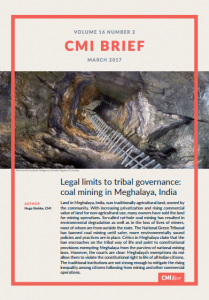Hugo Stokke (2017)
Bergen: Chr. Michelsen Institute (CMI Brief vol. 16 no. 2) 4 p.
Land in Meghalaya, India, was traditionally agricultural land, owned by the community. With increasing privatization and rising commercial value of land for non-agricultural use, many owners have sold the land for mining operations. So-called rat-hole coal mining has resulted in environmental degradation as well as in the loss of lives of miners, most of whom are from outside the state. The National Green Tribunal has banned coal mining until safer, more environmentally sound policies and practices are in place. Critics in Meghalaya claim that the ban encroaches on the tribal way of life and point to constitutional provisions exempting Meghalaya from the purview of national mining laws. However, the courts are clear: Meghalaya’s exemptions do not allow them to violate the constitutional right to life of all Indian citizens. The traditional institutions are not strong enough to mitigate the rising inequality among citizens following from mining and other commercial operations.
Legal limits to tribal governance
https://www.cmi.no/publications/6185-legal-limits-to-tribal-governance


